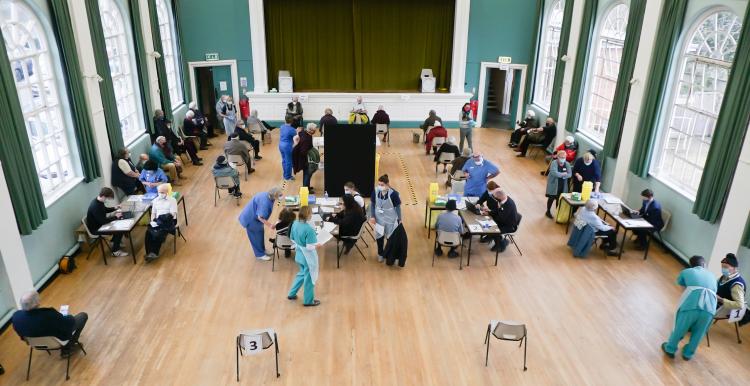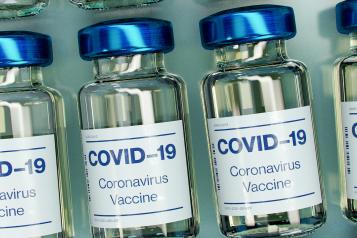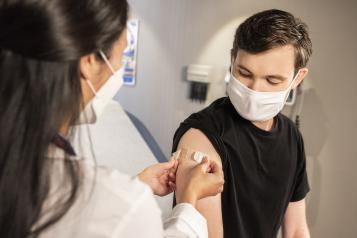What you need to know about the Covid-19 vaccine

Last updated on 5 April 2022
To check the latest Government guidance please visit Gov.uk.
We all have an important part to play to help the NHS deliver their vaccine delivery plan:
- When you are contacted, please book and attend your appointment(s);
- Turn up to your appointment on time, do not arrive early or late as the vaccination centres cannot accommodate you.
It is essential that everyone continues to follow key Covid-19 precautions, whether they have had the vaccine or not. These include testing when you have symptoms and isolating when you are contacted by NHS Test and Trace.
Additionally, you must now wear a face covering by law, unless you are exempt, in indoor settings. Find out all areas where a mask is required on the government website.
For the latest information about the vaccine go to the NHS website.
Download our Covid booster advice sheet
Common questions about the Covid-19 vaccine
Who can get the Covid-19 vaccine?
If you are aged 18 and over, you can get a 1st and 2nd dose of a Covid-19 vaccine.
If you are aged 16 or over
All those aged 16 or over can book their vaccination through the NHS booking service. You can also call 119 free of charge, anytime between 7am and 11pm seven days a week.
You can also find a walk-in Covid-19 vaccination site to get vaccinated without needing an appointment. Or you can wait to be contacted by your GP and book your appointment with them.
If you are aged 12 to 15
All children aged 12 to 15 can get the Covid-19 vaccine. You can get your vaccine at school or you can book a vaccination appointment online.
If you live with someone who is more likely to get infections, or you have a condition that means you are at high-risk from Covid-19, you will be offered two doses of the vaccine.
Children will be offered one dose of the Pfizer/BioNTech vaccine. Most vaccinations will be delivered through a school-based vaccination programme, the same as for HPV and Diphtheria, Tetanus and Polio.
If you receive home schooling, are in secure services, or specialist mental health settings, then provision will be put in place to ensure you are still offered one dose of the vaccine.
Parental, guardian or carer consent will be sought before vaccinations are given in line with existing school vaccination programme policies.
If you are aged 5 to 11
From Saturday 2 April 2022, parents of children aged between five and 11-years-old will also be able to arrange for their child to receive the coronavirus vaccine. This can be booked online at www.nhs.uk or over the phone by calling 119.
How long between my first and second dose of the vaccine?
You will usually receive your second dose up to 8-12 weeks after the first, regardless of the vaccine type. The second dose completes the course and is important for longer term protection.
How do I book my vaccine?
You'll need to book a 2nd dose for 8 to 12 weeks after your 1st dose.
- If you book online, you'll be asked to book appointments for both doses. You can manage your Covid-19 vaccination appointments to view your appointments and rebook if you need to.
- If you have your 1st dose at a walk-in vaccination site, you can book your 2nd Covid-19 vaccination appointment online. You'll need to wait 24 hours after your 1st dose before you can book.
- If you have your 1st dose through your GP surgery, you'll be contacted when it's time to book your 2nd dose.
Will I be offered a third dose?
People aged 12 years or older who had a severely weakened immune system at the time they had their second dose of the Covid-19 vaccine may be offered a third vaccine dose. This is different to the booster shots being offered.
This is because you may not have responded as well as other people and a third dose may help to improve your immune response and give you better protection.
People who may be offered a third dose include those who had or have:
- blood cancers (such as leukaemia or lymphoma)
- lowered immunity due to treatment (such as steroid medication, biological therapy, chemotherapy or radiotherapy)
- lowered immunity due to inherited disorders of the immune system
- an organ or bone marrow transplant
- diseases that affect the immune system such as poorly controlled HIV
- other diseases or treatments as advised by your specialist
Your GP will be in contact with your specialist and the NHS will let you know if you need a third dose and when and where to have the vaccine. Government guidance is available if you have further questions.
Will I be offered a booster shot?
People aged 75 and over, who had their initial booster vaccine at least six months ago, are now being encouraged to book their second top-up dose without delay.
Those in this age category, as well as any person aged 12 and over with a severely weakened immune system, do not need to wait to be contacted by the NHS, and can book online or call 119 to make an appointment.
How and when do I get my Covid-19 booster vaccine?
You will be offered the booster at least three months after your second dose.
Most people will be invited to book an appointment at a larger vaccination centre, pharmacy, or local NHS service such as a GP surgery.
Your GP practice will contact you when you are eligible for your booster shot. Please do not contact them first.
Which Covid-19 vaccine will I get?
Most people will be offered a booster dose of the Pfizer/BioNTech vaccine or Moderna vaccine.
This means your booster dose may be different from the vaccines you had for your 1st and 2nd doses.
Some people may be offered a booster dose of the Oxford/AstraZeneca vaccine if they cannot have the Pfizer/BioNTech or Moderna vaccine.
Are there any side effects?
Like all medicines, vaccines can cause side effects. Most of these are mild and short-term, and not everyone gets them.
You should not have the vaccine if you've ever had a serious allergic reaction to:
- a previous vaccine
- a previous dose of the same Covid-19 vaccine
Serious allergic reactions are rare. If you do have a reaction to the vaccine, it usually happens in minutes. Staff giving the vaccine are trained to deal with allergic reactions and treat them immediately.
You can report any side effects to the Coronavirus Yellow Card scheme.
I'm pregnant, can I still get the vaccine?
The Joint Committee on Vaccination and Immunisation (JCVI) has advised that pregnant women should be offered the Covid-19 vaccine at the same time as the rest of the population, based on their age and clinical risk group.
There have been no specific safety concerns identified with any brand of Covid-19 vaccines in relation to pregnancy.
It is preferable for pregnant women in the UK to be offered the Pfizer-BioNTech or Moderna vaccines where available. There is no evidence to suggest that other vaccines are unsafe for pregnant women, but more research is needed.
Women who are planning pregnancy, are in the immediate postpartum or are breastfeeding can be vaccinated with any vaccine, depending on their age and clinical risk group.
Protect yourself from fraud
In England, the Covid-19 vaccines will only be available via the NHS. You can be contacted by the NHS, your employer, a GP surgery or pharmacy local to you, to receive your vaccine.
Remember, the vaccine is free of charge. At no point will you be asked to pay.
- The NHS will never ask you for your bank account or card details.
- The NHS will never ask you for your PIN or banking password.
- The NHS will never arrive unannounced at your home to administer the vaccine.
- The NHS will never ask you to prove your identity by sending copies of personal documents such as your passport, driving licence, bills or pay slips.
Do I have to have the vaccine even though I've already had Covid-19?
An effective vaccine is the best way to protect people from Covid-19, reduce hospitalisations and save lives. Vaccines are the only way to eradicate disease.
People that have already had Covid-19 should still get vaccinated. It is still just as important for those who have already had Covid-19 as it is for those who haven’t.
Is the Covid-19 vaccine compulsory?
There are no plans to make the Covid-19 vaccine compulsory for the general population. Following consultation earlier this year, from 11 November 2021 people who work in care homes – both staff and volunteers – will need to be fully vaccinated. There are some exemptions and the requirement to be fully vaccinated will not extend to people who are visiting friends and families.
Do I need to self-isolate if I'm fully vaccinated?
If you’re fully vaccinated or under 18, you will not need to self-isolate following close contact with someone who has Covid-19. You’ll still need to take a PCR test and self-isolate if it’s positive. Read the latest guidance to find out when you should self-isolate.
How do I prove my vaccine status?
An NHS Covid Pass shows your coronavirus (Covid-19) vaccination details or test results. This is your Covid-19 status. You may be asked to show your pass to get into some events, where the Covid Pass is being trialed, or to travel abroad.
A digital Covid pass is available through the NHS App or the NHS website. A paper version is also available online.
The NHS App and/or the NHS Covid pass doesn't accurately reflect my vaccination record, what do I do?
The Vaccination Data Resolution Service aims to resolve missing or incorrect vaccination records for people vaccinated in England, Scotland or Wales who have a current NHS number and are registered with a GP practice in England. If you believe you have missing or incorrect Covid-19 vaccination data, please call 119 and ask the call agent to make a referral to the VDRS team on your behalf. The VDRS team will then aim to call you back within 21 days.
If you aren't registered with a GP, you will need to contact your local Clinical Commissioning Group (CCG) for assistance. You can find the CCG that covers the area where you live through this CCG list.
What does a vaccine do?
Vaccines teach your immune system how to create antibodies that protect you from diseases. It's much safer for your immune system to learn this through vaccination than by catching the diseases and treating them. Once a vaccine has trained your immune system to know how to fight a disease, it can often protect you for many years.
Are vaccines safe?
Vaccines are now safer than ever before. Any vaccine must first go through the usual rigorous testing and development process and be shown to strict standards of safety, quality and effectiveness before it can be deployed.
How do I feedback or complain about the NHS Covid-19 vaccine service?
If you are unhappy with the service you have received, it is important to let the NHS know. To provide feedback, raise a concern or make a complaint, please email england.contactus@nhs.net
Where do I go if I have more questions?
If you have more questions about the Covid-19 vaccination programme you can find more information on the NHS website.
BaNES, Swindon and Wiltshire Clinical Commissioning Group have a dedicated web page which is updated weekly with the latest Covid-19 information, as well as a Q&A on the vaccination programme.
bswccg.nhs.uk/latest-covid-19-updates
You can also email them if you have any questions.


